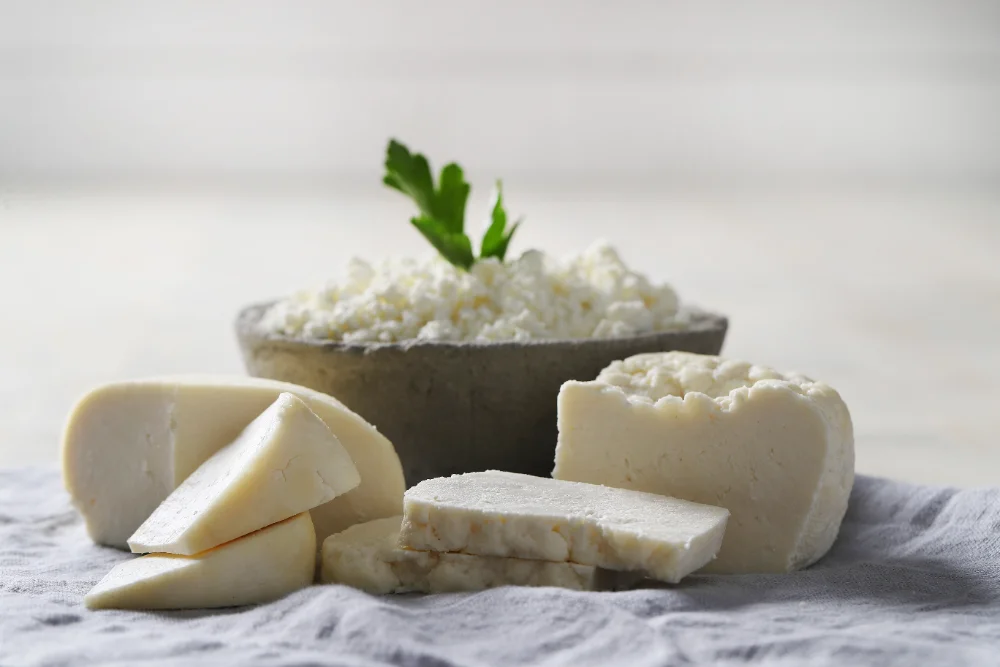It started with lasagne.
A towering, cheesy masterpiece I’d prepped for a dinner party that got cancelled last-minute (thanks, flu season). With nearly half a tub of ricotta left and a refrigerator already filled to the brim, I found myself asking: Can you freeze ricotta cheese? A quick online search gave me contradictory answers, ranging from “absolutely!” to “don’t even think about it.” So I decided to test it myself.
If you’ve ever stared at that creamy, grainy cheese and wondered if your freezer could extend its life, you’re not alone. This guide blends real-world kitchen testing, food safety insights, and expert-backed advice to answer the question once and for all.
What Happens When You Freeze Ricotta Cheese?
Ricotta is unique. It’s not quite a soft cheese like cream cheese, nor is it firm like cheddar. It sits in this in-between space that makes freezing a bit tricky.
When frozen, the moisture in ricotta forms ice crystals. These crystals disrupt the protein structure, leading to separation between the curds and whey. What you’re left with after thawing is a watery, somewhat grainy version of the original.
“Ricotta contains a lot of water. Freezing causes that water to separate, so you’ll notice changes in texture, though not necessarily in taste,” explains Emma Sutton, a UK-based food scientist and cheese educator.
That said, it doesn’t mean frozen ricotta is unusable. It just becomes better suited for certain dishes over others.
When (and When Not) to Freeze Ricotta
Ideal Uses After Freezing
- Baked Dishes: Think lasagne, baked ziti, stuffed shells. The altered texture isn’t noticeable once it’s been cooked.
- Pasta Fillings: Mixed with spinach or herbs, thawed ricotta works well in ravioli or cannelloni.
- Pancakes or Muffins: If you like using ricotta for added moisture in baked goods, the thawed version is perfectly fine.
Avoid in These Situations
- Spreading on Toast or Crackers: The smooth, creamy texture won’t be the same.
- Raw Salads or Cold Dips: Freshness and texture matter here; use fresh ricotta instead.
I once tried using thawed ricotta in a lemon ricotta salad and regretted it instantly. The texture was slightly crumbly and off-putting—lesson learned.
How to Freeze Ricotta Properly (Step-by-Step)
If you’re set on freezing it, here’s how to do it right:
1. Drain Excess Moisture
Use a paper towel or cheesecloth to gently press out extra water. This reduces the amount of separation upon thawing.
2. Portion It Out
Freeze in small amounts using airtight containers or freezer-safe bags. Label with the date.
3. Add a Protective Layer (Optional)
Cover the top with cling film before sealing to prevent freezer burn.
4. Freeze Flat
Especially if using bags. This saves space and makes thawing quicker.
5. Storage Time
Best used within 2 months. Technically safe for longer, but quality diminishes.
Thawing Ricotta: Best Practices
Always thaw ricotta in the fridge, never at room temperature. Slow thawing helps retain more of the original texture.
After thawing:
- Stir well to reincorporate separated liquid.
- Use within 2-3 days.
- Avoid refreezing once thawed.
I tested thawing at room temperature out of impatience. Don’t. The outer layer turned slimy while the middle was still icy. It was a waste.
Is It Safe to Freeze Ricotta Cheese?
Yes, from a food safety standpoint, it’s fine—as long as it’s fresh when frozen and kept at 0°F/-18°C or lower.
According to the UK Food Standards Agency, freezing cheese does not affect its safety but may affect texture and quality.
“If the cheese was nearing its use-by date, freezing won’t extend its safety—only its usability,” notes Sutton.
The Science Behind the Texture Change
Ricotta is made primarily from whey proteins. These proteins are delicate and not built to withstand ice formation.
When frozen:
- Ice crystals break down protein structures
- Water separates, causing graininess
- Fat content doesn’t preserve structure as it might in harder cheeses
Expert Tips: Making the Most of Thawed Ricotta
- Blend it! If the texture bothers you, use a food processor to whip it back to smoothness before use.
- Mix with other cheeses. Combine with cream cheese or mascarpone for a richer, smoother texture.
- Cook it through. Baked recipes hide textural flaws beautifully.
Alternatives to Freezing
If you’re not a fan of the texture change, consider:
- Making ricotta pancakes with leftover cheese.
- Whipping up a quick pasta sauce.
- Turning it into a cheese spread with herbs and lemon zest.
FAQs:
Can you freeze ricotta cheese in lasagne?
Yes. Once mixed into a dish like lasagne, ricotta freezes well without any noticeable texture change.
How long can you keep ricotta in the freezer?
Up to 2 months for best quality. After that, it’s still safe but may taste bland or have more water separation.
Can I refreeze ricotta cheese?
No. Once thawed, ricotta should not be refrozen. This increases the risk of bacterial growth and texture loss.
Does freezing affect ricotta’s taste?
Slightly. It becomes blander and grainier, but seasoning can revive its flavour.
Is it better to use whole milk ricotta for freezing?
Yes. Whole milk ricotta holds up slightly better than skim due to its fat content.
Final Takeaway
So, can you freeze ricotta cheese? Yes, but do it wisely.
If you’re expecting the same silky texture after thawing—you’ll likely be disappointed. But if you’re using it in cooked dishes or don’t mind giving it a quick blitz in the blender, frozen ricotta can absolutely be part of your zero-waste kitchen strategy.
I’ve made my peace with its quirks. These days, I portion out any extra ricotta and toss it into the freezer without hesitation. It’s not perfect, but it’s practical—and sometimes, that’s all you need.
Have you tried freezing ricotta? Share your experience below. Did it work out, or end in cheesy disaster? Let’s talk.

















